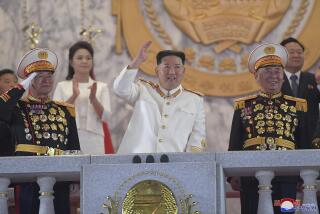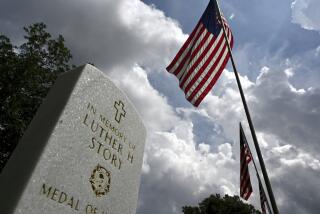Widows of 2 Slain Officers Visit Korea
- Share via
PANMUNJOM, South Korea — Widows of two U.S. officers axed to death by North Korean border guards in 1976 visited the murder site today and heard a U.S. Army general pledge efforts to transform the tense Korean armistice into a lasting peace.
In a brief address, Gen. William Livsey, head of the U.S.-led United Nations Command (UNC), described the ax murders as an unprovoked attack and said they symbolize the “friendship forged in blood” between the United States and South Korea.
His voice breaking with emotion, he added: “If any North Koreans ever listen to us, the United States and the Republic of Korea want peace. We stand ready to guarantee that peace.
“Remember that we only have armistice here, not peace,” Livsey said.
The two officers, Maj. Arthur Bonifas and 1st Lt. Mark Barrett, were hacked down 10 years ago today while escorting a civilian work party a few yards from the border to prune a poplar tree blocking the view from a military lookout post.
Wreathes at Tree
Their widows, Marcia Bonifas and Julianne Barrett, attended ceremonies at the Demilitarized Zone today to commemorate the murders.
Later, to the blare of martial music from loudspeakers in the north, they laid wreaths at the foot of the tree where the two men died.
Reporters watched from the lookout post as they went down to the dead tree stump on a narrow strip of land almost surrounded by Communist territory.
The UNC, policing the armistice that halted the 1950-53 Korean War, renamed its advance camp on the southern edge of the DMZ “Camp Bonifas” and said a new building there would be named after Barrett.
Visited Lookout Post
After unveiling plaques at the advance camp, Bonifas, accompanied by her three teen-age children, and Barrett traveled the 1 miles to the UNC lookout post from which horrified soldiers watched the 1976 killings.
Four U.S. soldiers and four South Korean troops were injured in the clash, which lasted less than five minutes. After a big U.S. military mobilization, including the dispatch of a naval task force to the area, North Korean leader Kim Il Sung expressed regrets for the incident.
In a statement read to reporters, Bonifas and Barrett said: “It is our hope that our husbands’ deaths, and the continuing efforts of the men who serve here today, will someday make peace possible.”
More to Read
Sign up for Essential California
The most important California stories and recommendations in your inbox every morning.
You may occasionally receive promotional content from the Los Angeles Times.













